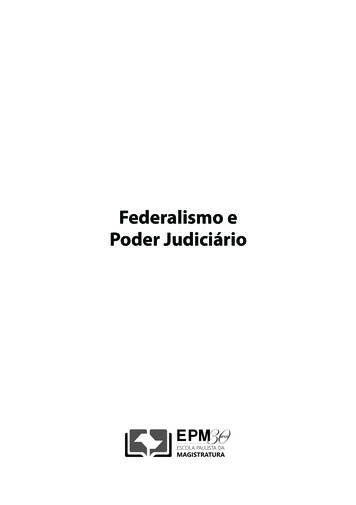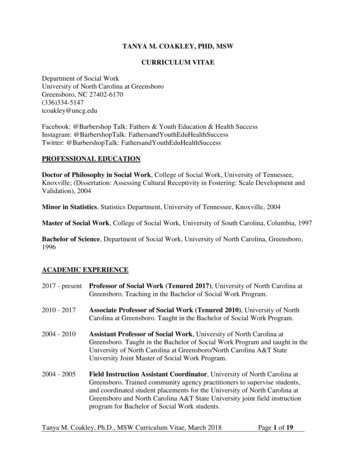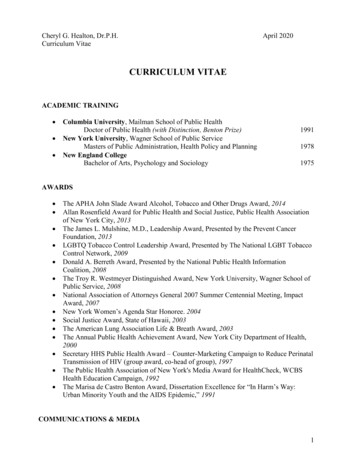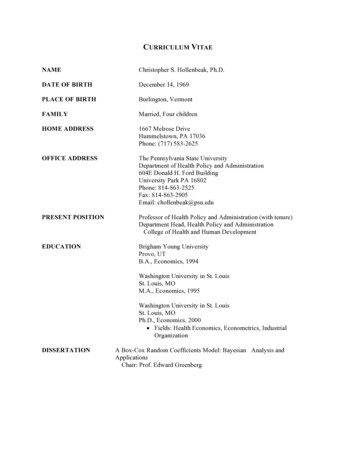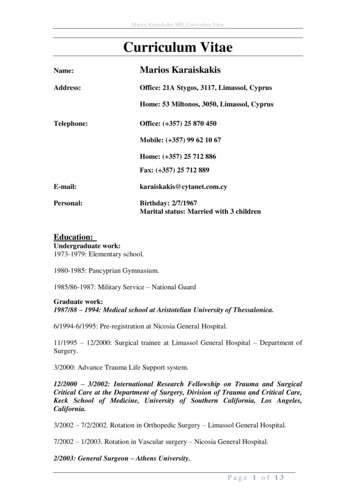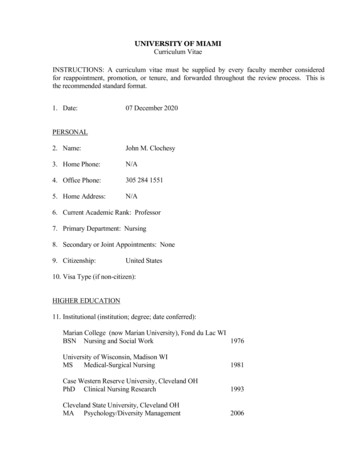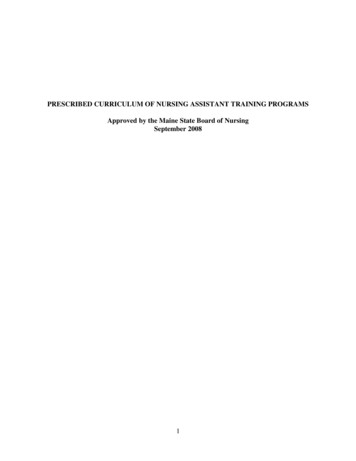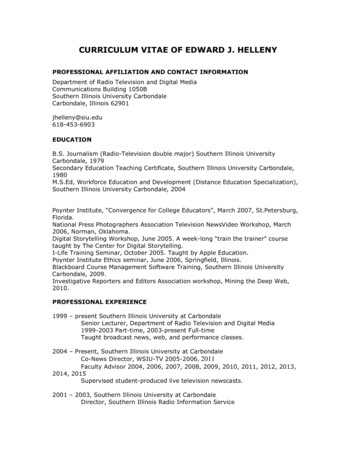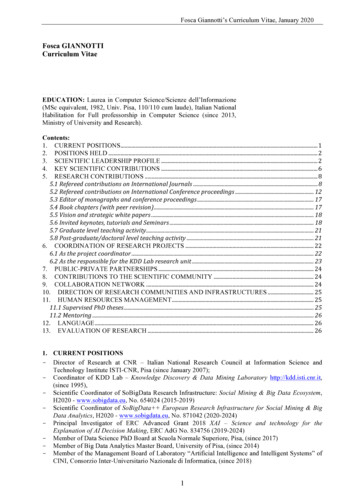
Transcription
Fosca Giannotti’s Curriculum Vitae, January 2020Fosca GIANNOTTICurriculum VitaeGENERAL: Fosca Giannotti was born on 4 October 1958 inCastiglione Garfagnana (Lucca, Italy).She is married and has two children (of 25 and 28).FISCAL CODE: GNNFSC58R44C303VEDUCATION: Laurea in Computer Science/Scienze dell’Informazione(MSc equivalent, 1982, Univ. Pisa, 110/110 cum laude), Italian NationalHabilitation for Full professorship in Computer Science (since 2013,Ministry of University and Research).Contents:1.CURRENT POSITIONS.12.POSITIONS HELD.23.SCIENTIFIC LEADERSHIP PROFILE.24.KEY SCIENTIFIC CONTRIBUTIONS.65.RESEARCH evelteachingactivity.215.8Post- DINATION OF RESEARCH TE PARTNERSHIPS.248.CONTRIBUTIONS TO THE SCIENTIFIC COMMUNITY.249.COLLABORATION NETWORK.2410.DIRECTION OF RESEARCH COMMUNITIES AND INFRASTRUCTURES.2511.HUMAN RESOURCES ng.2612.LANGUAGE.2613.EVALUATION OF RESEARCH.261. CURRENT POSITIONS- Director of Research at CNR – Italian National Research Council at Information Science andTechnology Institute ISTI-CNR, Pisa (since January 2007);- Coordinator of KDD Lab – Knowledge Discovery & Data Mining Laboratory http://kdd.isti.cnr.it,(since 1995),- Scientific Coordinator of SoBigData Research Infrastructure: Social Mining & Big Data Ecosystem,H2020 - www.sobigdata.eu, No. 654024 (2015-2019)- Scientific Coordinator of SoBigData European Research Infrastructure for Social Mining & BigData Analytics, H2020 - www.sobigdata.eu, No. 871042 (2020-2024)- Principal Investigator of ERC Advanced Grant 2018 XAI – Science and technology for theExplanation of AI Decision Making, ERC AdG No. 834756 (2019-2024)- Member of Data Science PhD Board at Scuola Normale Superiore, Pisa, (since 2017)- Member of Big Data Analytics Master Board, University of Pisa, (since 2014)- Member of the Management Board of Laboratory “Artificial Intelligence and Intelligent Systems” ofCINI, Consorzio Inter-Universitario Nazionale di Informatica, (since 2018)1
Fosca Giannotti’s Curriculum Vitae, January 2020-2.--Member of the Steering Committee of EUDAS: European Data Science Association, LuxembourgUniversity (since 2017)Member of Sinergia evaluation commission of SNSF Swiss National Science Foundation (20192023)Member of scientific advisory board of TU/e – Eindhoven University of Technology (since October2019).External Advisory Board del Centro SmartData@Polito, Politecnico di Torino (since 2018)Chair of “Area Progettuale Data, Content and Media” of Department Ingegneria, ICT e Tecnologieper l'Energia e i Trasporti of CNRPOSITIONS HELDMember of Italian Delegation of G7-Academy for Canada 2018 G7 at Ottawa (March 19-20 2018).Senior Program Committee Member ACM SIGKDD 2018, London UKAward Chair of DSAA (Data Science and Advanced Analytics 2018), Torino ItalyChair of the Management board of the European Lab on Social Mining and Big Data Analytics(2013-2017), an inter-institutional aggregation of 10 research labs across all universities and researchcenters in Pisa (100 data science researchers): CNR, Univ. Pisa, Scuola S. Anna, Scuola Normaleand Scuola IMT-LUCCA.General Chair of DSAA (Data Science and Advanced Analytics 2017), Tokyo Japan;Member of the International Evaluation Panel of INRIA (France) for Theme Data and KnowledgeRepresentation and Processing: 2015 (Panel chair) and 2011.Member of Advisory Board H2020, FET-Excellent Science, Research Infrastructures and einfrastructures, (2014-15);Chair of Steering Committee of European Conf. on Machine Learning and Data Mining (2012-2015).National Coordinator of Data mining and Semantic Web project of ICT Department of CNR, (20062009)CNR Senior Researcher (Primo ricercatore) (2001-2007, CNUCE-CNR, Pisa)CNR Researcher (1990-2001, CNUCE-CNR, Pisa)Industrial researcher – Team Leader – Systems & Management R&D Lab, Pisa (1987-1990) andSIPE Optimation R&D Lab, Pisa (1985-1987)Industrial consultant – INTECS S.p.A, R&D Lab, Pisa (1984-1985)Research fellow – Progetto Finalizzato Informatica DATAID, Università di Pisa (1982-1984)Visiting professor, School of Economics, Univ. Paris1-Sorbonne (Sept-2016-Nov. 2016),Visiting professor, Central European University, Budapest, (October 2015-December 2015),Visiting scientist, Toyota InfoTechnology Center, and KDDI Labs, Tokyo (November-December2013) and (December 2014);Visiting professor, Barabási Lab, Center for Complex Network Research, Northeastern University,Boston (2009-2010),Visiting professor, UCLA Dept. of Computer Science, Univ. of California at Los Angeles (2006),(short term mobility CNR)Visiting professor, UCLA Dept. of Computer Science, Univ. of California at Los Angeles (1995),(short term mobility CNR)Visiting professor, CWI Amsterdam, The Netherlands (1993), (short term mobility CNR)MCC, Microelectronics and Computer Technology Corporation, Austin, USA funded by a NATOCNR fellowship (1989-1990).3. SCIENTIFIC LEADERSHIP PROFILEF. GIANNOTTI has been an active researcher in computer science for 35 years. In the first part of hercareer, the focus of her activity was on formal methods in programming, especially logic programming;progressively, she shifted towards logic and formal methods in databases and, eventually, to pioneeringdata mining and knowledge discovery. Her path, essentially, is from computing to data to knowledge,with a progression tied up with logic and formal methods, and a natural taste for combining theory withempirical evidence through data analysis.2
Fosca Giannotti’s Curriculum Vitae, January 2020F. GIANNOTTI had the intuition, around 1992, of data mining as a high potential area of disruptiveimpact and her determination brought to the construction of a research group around this vision, capableof gaining international visibility. The scientific production has been progressively increasing as well hasher scientific leadership at national and international level. The KDD LAB (Knowledge and DiscoveryLaboratory) is a tangible result of this vision, being today a reference, top-ranked lab for the data miningresearch community, one of the largest and most competitive, capable of attracting international visitors,post-docs, and students, and establishing a large network of high-level international collaborations.1995 – onwards: the construction of the KDD LAB. The most important shift in F. GIANNOTTI’sscientific career takes place around 1995, when, together with colleagues Dino Pedreschi and FrancoTurini of Univ. Pisa, she starts the Pisa Knowledge Discovery and Delivery Laboratory – KDD LABhttp://www.isti.cnr.it/research/unit.php?unit KDD/ – a joint initiative of the two research institutions(CNR and Univ. Pisa) aimed at research in the emerging field of Data Mining and Knowledge Discoveryin Databases. Since then, when KDD LAB was the earliest research lab in data mining in Italy and one ofthe earliest in Europe, it has grown as an established joint, interdisciplinary initiative, and gained a solidinternational reputation in the highly competitive area of data mining.In 1998-1999 F. GIANNOTTI coordinated a task force of 10 young Phd students of 3 different Universityfor the execution of a one year long massive experiment on the real data of the Ministry of Finance. Theresults of the fiscal fraud detection study were published at the ACM KDD Conf. in 1999 in the seminalpaper “A classification-based methodology for planning audit strategies in fraud detection” F Bonchi, FGiannotti, G Mainetto, D Pedreschi, in the Proceedings of the fifth ACM SIGKDD, 117 citations onGoogleScholar as of Jan 2020. Those young students are now senior researchers in academies andresearch Institutions all over Italy (for example Francesco Bonchi now at ISI foundation, Mirco Nanni atISTI CNR, Giuseppe Manco at ICAR CNR etc), all active and well-known in the DM&ML scientificcommunity. Today, KDD LAB continues to collaborate with the Ministry of Finance to deploy datamining prediction models into their routine activity of inspection against tax evasion.On another line, KDD LAB has a long-standing collaboration with Coop, the largest Italian supermarketchain, in the analysis and mining of sale transaction data for advanced CRM applications. Suchcollaboration has made possible the construction of a big data set of 10 years of detailed retail data of 2million customers. It has been and still is the biggest supermarket dataset available for training DataMining and Machine Learning students and for research, ranging from smart CRM (KDD2017) to socialmining studies aiming at leveraging the data for nowcasting socio-economic and health-related indicators,such as flu epidemics, migrant integration and wellbeing.Today, KDD LAB counts on 4 senior researchers, 7 researchers, 7 post-docs, 9 PhD students, 5technicians, and a variable number of international visitors and master students; KDD LAB is organizedaccording 5 lines of research: Mobility Data Mining for Science of Cities, Social Network Analysis and Visual Analytics, Ethical Data Mining, Applied Data Science, Analytical Platforms and Infrastructures for Social Mining.2005 – 2008: the shaping of a new scientific area at the cross road of Mobility, Data Mining andPrivacy: F. GIANNOTTI is the proposer and later the coordinator of the European FP6 FET projectGeoPKDD – Geographic Privacy-aware Knowledge Discovery and Delivery – www.geopkdd.eu.Centered on mobility, data mining and privacy, GeoPKDD involves more than 40 researchers from 8different European countries, many of those young postdocs, and produces a great deal of high-impactnew scientific results, becoming the reference for the rapidly blossoming area of the analysis of mobilitydata sensed by mobile phones and other localization devices. Prominent researchers involved in suchinitiative were for example Monica Wachowicz, now professor at University of New Brunswick, Nataliaand Gennady Andrienko, now professors at City University London, and Yannis Theodoridis professor atUniversity of Piraeus in Greece.The book “Mobility, Data Mining and Privacy” (Springer in 2008), edited by F. GIANNOTTI spread theresults obtained by GeoPKDD and brought a wide recognition to KDD LAB as a leading research hub onmobility data mining and data privacy technologies, becoming a reference not only for the international3
Fosca Giannotti’s Curriculum Vitae, January 2020research community but also for leading industrial and public operators, such as telecom providers(Orange, Wind, Telecom Italia), the Italian and European Data Protection Commissions, the mobilityagencies of regional and municipal administrations. Follow up of this project have been 3 other FETOpen FP7 projects (FET stays for Future Emergent Technology): MODAP(Mobility, Data Mining, and Privacy), LIFT (Using Local Inference in Massively Distributed Systems), DataSIM (Data Science for Simulation into the era of electric vehicles) (http://datasim-fp7.eu)and one within the Smart Cities program: PETRA: Personal Transport Advisor: an integrated platform of mobility patterns for Smart Citiesto enable demand-adaptive transportation system (http://petraproject.eu/).F. GIANNOTTI has always been part of the proponent team, principal investigator for CNR andresponsible of workpackages of the projects.2006 – 2009: national coordinator of the Data Mining sector of the CNR ICT Department. F.GIANNOTTI has been nominated by the president of CNR as the national coordinator of the area “DataMining and Semantic Web” of the ICT department of CNR, with responsibility of harmonizing theactivities of 12 labs of 9 different CNR institutes all over Italy involving 90 permanent researchers and120 early-stage researchers. The goal was to create a network of CNR researchers on the topic ofknowledge and data engineering and promote their results and potential applications towards industry andthe public administration. Her duties involved dissemination actions, proposal preparation, definition ofstrategic lines of research at national level, harmonization with European policies, hearings with fundingagencies, etc.2009 – 2010: shaping the convergence of data mining and network science. In 2009-2010 visiting theCenter for Complex Network Research at Northeastern University in Boston, in collaboration withphysicist A.-L. Barabasi, F. GIANNOTTI has laid the basis for a convergence of the methods ofstatistical physics and complex systems with data mining, aimed at understanding and forecasting aspectsof the socio-economic complexity, such as diffusion and spreading, shopping behavior, mobility patterns.This line of research has brought to the paper Human mobility, social ties, and link prediction, publishedat KDD 2011, while in Sept. 2015 another joint paper with Barabasi on the data-driven discovery of twowell-separated profiles of human mobility, explorers and commuters, has been published in NatureCommunications.2011 – 2013: guiding the Italian component of FuturICT Flagship initiative https://futurict.eu.Member of the proponent team. The initiative was aimed at shaping a 10 year program of research inEurope. The ultimate goal of the FuturICT project was to understand and manage complex, global,socially interactive systems, with a focus on sustainability and resilience. F. tee) contributed to the two year process for the proposalpreparation. The FuturICT FET Flagship proposal intended to unify hundreds of the best scientists inEurope in a 10 year 1 billion EUR program to explore social life on earth and everything it relates to. wasnot selected for funding, but indeed the experience has been valuable both from the point of thecommunity that has been created and the research roadmap that has been shaped. F.G. participated to thewriting of following white papers published into The European Physical Journal Special Topics Vol. 214:the first two represent the pillars of privacy-aware social data mining while the last focuses on theapplication of such paradigm for a new City Science. A planetary nervous system for social mining and collective awareness . F. Giannotti, D. Pedreschi,A. Pentland, P. Lukowicz, D. Kossmann, J. Crowley and D. Helbing. Eur. Phys. J. Special Topics214, 49-75 (2012) http://dx.doi.org/10.1140/epjst/e2012-01688-9 (open access) 63 citations on GS asof Jan 2020. FuturICT – The road towards ethical ICT , J. van den Hoven, D. Helbing, D. Pedreschi, J. DomingoFerrer, F. Giannotti and M. Christen. Eur. Phys. J. Special Topics 214, 153-181 2 (open access) 1373 citations on GS as of Jan 2020. Smart cities of the future, M. Batty, K.W. Axhausen, F. Giannotti, A. Pozdnoukhov, A. Bazzani, M.Wachowicz, G. Ouzounis and Y. Portugali. Eur. Phys. J. Special Topics 214, 481-518 3 (open access) One of the most downloaded articles ofEPJ-ST, with 31K downloads. 1373 citations on GS as of Jan 2020.4
Fosca Giannotti’s Curriculum Vitae, January 20202013 – 2017: the creation of the SoBigData initiative: shaping Data Science. F. GIANNOTTI haslaunched in 2013 the SoBigData (Social Mining and Big data Analytics) initiative www.sobigdata.it, anetwork of 10 research labs across all universities and research centers in Pisa (100 data scienceresearchers). SoBigData.it aims to perform advanced research and analyses on the emerging challengesposed by big data, namely the digital breadcrumbs of human activities continually sensed by the ICTsystems that people use. SoBigData is awarded in 2015 by a European grant and become SoBigData.euintegrating also other existing European Research Centers operating on Big Data (www.sobigdata.eufunded by the EC under the H2020 Excellent Science program). F. GIANNOTTI is the scientificcoordinator responsible of the execution of the project. SoBigData is a research infrastructure (RI)providing an integrated ecosystem for ethic-sensitive scientific discoveries and advanced applications ofsocial data mining on the various dimensions of social life, i.e. an open data science infrastructure forsupporting data-driven, inter-disciplinary research as recorded by “big data”. SoBigData involves 11partners of 6 European countries.F. GIANNOTTI has been in charge of writing several position papers on influential venues characterizethe scientific challenges of the emerging paradigm of Data Science. In 2013, for the European ResearchConsortium for Informatics and Mathematics (www.ercim.eu) F. GIANNOTTI coordinates a group ofmajor experts in Europe realizing the paper [46] aimed at setting the European research agenda on BigData Analytics. In 2013 was nominated member of Horizon2020 Advisory Group on RI including einfrastructures and she was the principal author of the position paper [45] aimed at highlighting theactions to be included into the 2016-2018 WorkProgramme for Research Infrastructure for maximizingthe data exploitation in science. In 2017 CNR designated Fosca GIANNOTTI as writer of the positionpaper on “Data Science” [44], a preparatory document for the G7 Academy Joint Statement on Neweconomic growth: the role of science, technology, innovation and infrastructure that recognizes datascience as an “emerging technology with a potential to impact virtually all economic activities.” In 2018CNR has designated F. GIANNOTTI to participate as Italian representative at G7 Academy at Ottawa,19-20 March 2018, with duty on finalizing the official statement on “Digital Future”.2017-2020 – at the crossroads of Data Science and AI: shaping the research roadmap of Humancentric Artificial Intelligence. Leveraging the scientific excellence gained on ethically-minded datascience and big data analytics oriented towards common good and wellbeing, F.G. has a key role inshaping the European scientific community of Human-centric Artificial Intelligence, a construction thatbegan in 2017 with the proposal of the Humane-AI project as a candidate of the H2020 FET Flagshipprogram. F.G. lead the CNR partner of Humane-AI as one of the few core partners of the project, togetherwith DFKI and INRIA. Humane-AI was funded by the EC in 2018, becoming the first pan-Europeancollaboration action tasked with the definition of the research roadmap of novel forms of AI that areethical by-design and beneficial to humans, both at individual and societal level. A key aspect of thisscientific agenda brought forward by F.G. is “Explainable AI (XAI)”, i.e., how to devise machinelearning decision and classification models that not only have a high predictive accuracy, but also providehuman comprehensible means to explain the rational of the predictive decisions and classifications. Suchexplicability feature is key to design hybrid human-machine interaction and decision systems that aretruly able to empower human decision making, thus expanding human agency and dignity (instead of thecontrary.) F.G. and her collaborators quickly became a key reference for the booming field of XAI,counting today an amazing number of publications worldwide: the seminal survey paper by F.G. andcollaborators received more than 350 citations in less than one year. In 2019, F.G. received a prestigiousERC Advanced Grant as a PI, entitle precisely “XAI – Science and technology for the Explanation of AIDecision Making”. She is also the coordinator of the XAI workpackage of the AI4EU H2020 project,which is developing the AI on-line platform for Europe. Also, in view of the advent of the HorizonEurope framework, the Humane-AI project is being re-targeted; accordingly, F.G. is leading CNR as acore partner the proposal “Humane-AI-Network”, submitted to the call ICT-48-2020 “Towards a vibrantEuropean network of AI excellence centres”. On a different line of the same call, F.G. is also leadingCNR as a core partner of the TAILOR proposal “Foundations of Trustworthy AI integrating Learning,Optimisation and Reasoning”. In the meantime, the SoBigData research Infrastructure has been approvedin 2019 to the next stage of “Advanced Community”, still under the general coordination of F.G., with abroader partnership and focus and a higher funding for four more years 2020 till 2024, under the acronymSoBigData . Coherently with F.G. scientific vision, SoBigData will serve as a platform for ethically-5
Fosca Giannotti’s Curriculum Vitae, January 2020minded data science and AI, stressing the human-centric view towards achievements of broad socialimpact. F.G. has been invited to present this vision and her latest achievements at two prestigious venues:the Global Forum on AI for Humanity, organized by the French Government in Paris in October 2019,and the European Parliament in November 2019 at the conference on AI for Citizens’ wellbeing. Riccardo Guidotti; Anna Monreale; Fosca Giannotti; Dino Pedreschi; Salvatore Ruggieri; FrancoTurini. Factual and Counterfactual Explanations for Black Box Decision Making. IEEE IntelligentSystems DOI: 10.1109/MIS.2019.2957223 (2020) R Guidotti, A Monreale, S Ruggieri, F Turini, F Giannotti, D Pedreschi. A survey of methods forexplaining black box models. ACM Computing Surveys (CSUR) 51 (5), 93 (2019) (350 cit. in lessthan one year) D Pedreschi, F Giannotti, R Guidotti, A Monreale, S Ruggieri, F Turini. Meaningful explanations ofBlack Box AI decision systems. Proceedings of the AAAI Conference on Artificial Intelligence 33,9780-9784 (2019)4. KEY SCIENTIFIC CONTRIBUTIONSIn this section three high-impact papers for each of the current research lines are highlighted.Mining mobility data: spatio-temporal data mining techniques for trajectories of moving objectsreconstructed from telecommunication logs, especially from mobile phones and other location-awaredevices. The early results by F.G. in trajectory pattern discovery, trajectory clustering and anonymitypreserving pattern discovering, presented at major data mining conferences since 2007, contributed toforge the newly emergent area, and influenced the research of many young researchers within and outsidethe GeoPKDD community. The methods proposed by F.G. with her team provide the novel basements forUnderstanding Human mobility in the era of Big Data. Contributions of the three selected papers are alsothe basic component of the seminal paper with Mike Batty: Smart Cities of the Future [24] and arehighlighted by the following three publications: Contributions of the three above selected papers are alsothe basic component of the seminal paper of 2012 with Mike Batty: Smart Cities of the Future, in EPJSpecial Topics [27], 1373 citations on GoogleScholar as of Jan 20201. Mobility, Data Mining and Privacy: Geographic knowledge discovery. Edited by Fosca Giannotti andDino Pedreschi. Springer 2008, 339 citations on GoogleScholar on Jan 2020. The book containsselected paper by the activities of the EU project GeoPKDD (Geographic Privacy Aware KnowleedgeDiscovery) coordinated by Fosca Giannotti. This book has marked the emergence of a new area ofresearch: Mobility, Privacy-preserving Data Mining.2. F. Giannotti, M. Nanni, F. Pinelli, D. Pedreschi: Trajectory pattern mining. 13th ACM SIGKDD Int.Conf. on Knowledge Discovery and Data Mining KDD 2007: 330-339. 1138 citations onGoogleScholar on Jan 2020. It has been the first to formulate the problem of trajectory patterndiscovery and has provided a first algorithm for spatio-temporal data mining. It has been nominatedfor the SIGKDD 2017 test of time award.3. F. Giannotti, M. Nanni, D. Pedreschi, F. Pinelli, C. Renso, S. Rinzivillo, and R. Trasarti.Unveiling the complexity of human mobility by querying and mining massive trajectory data. TheVLDB Journal 20(5), 695-719, 2011. 314 citations on GoogleScholar on Jan 2020. This papersummarizes the methods of mobility data mining (trajectory pattern discovery and clustering oftrajectory data) proposed by KDD Lab using its platform M Atlas. M Atlas is one of the majoroutcomes of project GeoPKDD. It was selected among the top 10 achievements ever within EU FETOpen projects, and invited for showcase at the European Parliament in April 2010 at the presence ofthe European Commissioner for Digital Agenda, Neelie Kroes.Complex network analysis and data mining: data mining techniques for the discovery of patterns fornetwork (graph) data, and their combination with the models of network science. Main results: networkanalytics for multi-dimensional networks, discovery of eras in evolving social networks, analysis ofdynamic mobile social networks. The most impactful contribution has been the integration of data-drivendiscovery of local patterns and clusters with global models developed by statistical physicists, to devisemore realistic generative models of mobility and social systems. These line of research has been carried6
Fosca Giannotti’s Curriculum Vitae, January 2020out in collaboration with complex system physicist A.-L. Barabási, also within the FP7 FET-Open projectDATASIM: Data Science for Simulation in the Era of Electric Vehicles. The first, most influential papersalong this line are the followings::1. Dashun Wang, Dino Pedreschi, Chaoming Song, Fosca Giannotti, Albert-László Barabási: Humanmobility, social ties, and link prediction. KDD 2011: 1100-1108, 630 citations on GoogleScholar onJan 2020, which investigates the limit of predictability of social links base not only on networkfeatures but also mobility features.2. L. Pappalardo, F. Simini, S. Rinzivillo, D. Pedreschi, F. Giannotti, A.-L. Barabási. Returners andexplorers dichotomy in human mobility. Nature Communications 6, Article number: 8166 (2015),158 citations on GoogleScholar on Jan 2020. The paper, studying how the considerable variability inthe characteristic travelled distance of individuals coexists with a high degree of predictability oftheir future locations, discovered the existence of two distinct classes of individuals: returners andexplorers and develop more realistic models able to capture the empirical findings. This paper is atthe base of constructing what-if analysis scenarios where different percentage of those two class ofindividuals may turn into a different impact on mobility-dependent phenomena, such as pollution,epidemics, traffic etc3. M. Coscia, G. Rossetti, F. Giannotti, D. Pedreschi: DEMON: a local-first discovery method foroverlapping communities. 18th ACM SIGKDD international conference on Knowledge discoveryand data mining, 615-623 , (2012), 189 citations on GoogleScholar on Jan 2020. The paper proposesa simple local-first approach to community discovery, able to unveil the modular organization of realcomplex networks. A label propagation algorithms starting by the ego networks of each node;generates local communities and the merge them into
- Member of Data Science PhD Board at Scuola Normale Superiore, Pisa, (since 2017) - Member of Big Data Analytics Master Board, University of Pisa, (since 2014) - Member of the Management Board of Laboratory "Artificial Intelligence and Intelligent Systems" of CINI, Consorzio Inter-Universitario Nazionale di Informatica, (since 2018)
